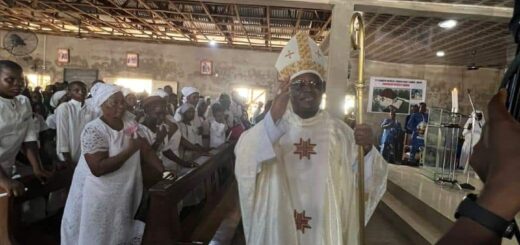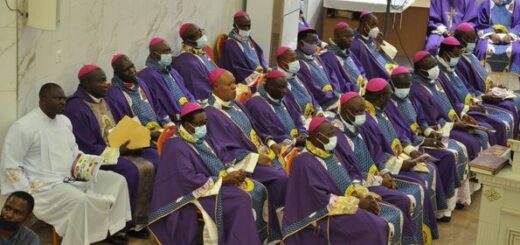Solitude and Leadership
by ARCH BISHOP · July 18, 2021
Sixteenth Sunday in Ordinary Time, Year B. Homily by Archbishop I. A. Kaigama at St. Donald Karu, Abuja, July 18, 2021.
Readings: Jer. 23:1-6; Ps 22(23); Eph. 2: 13-18; Jn. 6:30-34
From the Gospel of Mark today we read the story of Jesus receiving a comprehensive report from the Apostles after He sent them out to preach without counting the cost. Recognizing that the Apostles were stressed and exhausted, upon their return, Jesus said to them, “Come away to a deserted place all by yourselves and rest a while” (Mk. 6:31). Even when the people from every town hurried ahead of them on foot to their place of rest, Jesus had compassion on them and sat down to feed them with the word of God, after which He directed that they should be given something to eat.
A good leader is always compassionate. He feels the pains of his people and is ever available to them and uses all the resources in his power for their good. He or she seeks to foster the spirit of solidarity, harmonious coexistence and proper integration to achieve set goals rather than stir division and hate.
Jesus by asking the Apostles to go away to a quiet place where they could be refreshed, He was teaching the importance of solitude.
Solitude is rare today, as the indiscriminate use of mobile phones, Ipads, laptops, computers, etc., in a manner that at family or social gatherings and even in the Church during Mass or spiritual programmes, people easily withdraw into their world of digital technology and almost ignore the presence of others. We must seek “a desert place”, not in the modern communication gadgets, but to withdraw now and again into the depth of our being to reflect on how our work and life are coming from, going to and centered in our relationship with God through Jesus. We must guard against hyperactivity by creating quiet moments for reflection. Silence and solitude as Jesus recommended for His Apostles help to re-energize us. The attempt by modern society to promote a God-free zone, to replace every quiet time with so much noise will wound us psychologically and spiritually.
When we come to Mass or attend Church services, it must not be like we are coming for an entertainment by liturgical dancers, choristers, stylish preachers or priests who act up, but to a privileged moment of encountering Jesus personally.
The first reading from Prophet Jeremiah shows the prophet raging against the unholy alliances of King Zedekiah with pagan nations instead of placing absolute trust in God. Jeremiah was dismayed by political leaders of the time who failed to cater for the people entrusted to their care, but were rather interested more in their personal comfort, thus, exploiting and scattering the people. Prophet Jeremiah decried this failure of leadership, characterized by lack of vision, which led to the destruction of Judah and the taking into captivity of the people by King Nebuchadnezzar.
Of the many challenges we face as a country, the challenge of leadership prevails. Persons who have been duly elected and saddled with the responsibilities of offering service to the teeming populace end up exploiting the poor masses and embezzling public funds meant to provide basic social amenities such as food, clothing, shelter, education, security, healthcare services and many others.
Jeremiah’s prophecy of a virtuous branch from the descendant of David to reign as a true and diligent king found fulfillment in Jesus. In our case too, once there is life, there is hope. Even in such difficult times of political, social and economic crises, God promises to restore and heal our land. “I will appoint shepherds for them who will shepherd them so that they need no longer fear and tremble; and none shall be missing, says the Lord” (Jer. 23:4).
Today, God offers a serious admonishment to all leaders; priests as well as pastors, parents/guardians, teachers, and indeed, all who are in leadership positions to watch over those under their care with tenderness and compassion; not with negligence and indifference. Political leaders should protect the helpless masses from violent attacks on their lives and destruction of their property. Priests and pastors of souls should protect the faithful from the wave of erroneous teaching by promoting sound moral and doctrinal teachings. Parents/guardians should protect the children from domestic violence and any form of child abuse. Teachers should offer helpful guide by way of example to the younger ones.
The second reading from the Letter to the Ephesians (Eph. 2:13-14) should provide an inspiration to those who lead. They, like Jesus, should break down the barriers that once divided us; pull down the walls of hatred between the different ethnic and religious groups and promote unity, peace and genuine patriotism.
Today, leaders are challenged to have the heart of Jesus; to exercise authority with fidelity and responsibility; like Jesus, to empty themselves of power and to empathize with the suffering of the people. In the face of rising food prices and the fear that next year will even be more difficult as many farmers are unable to go to farm due to fear of attacks by bandits and kidnappers, genuine leaders should be very concerned and take adequate proactive measures against hunger and starvation.
May Jesus the good shepherd lead us to greener pastures; to guide us along the right paths; to provide our security amidst insecurity, so that even if we walk through the valley of death we would not be harmed; to prepare the true banquet that will quench our thirst and satisfy our hunger.
I congratulate the parish priest, Rev Fr. Boniface Ngene, and you the parishioners of St. Donald’s Karu, on the occasion of the 20th anniversary of your Parish. I also wish you a happy feast day celebration. Remain rooted in Christ, with Christ and do all things through Christ.




